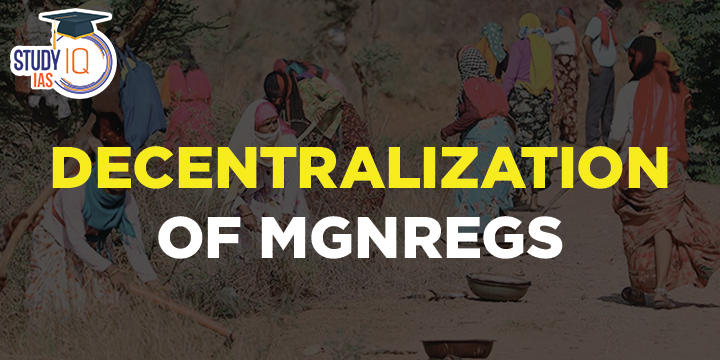Table of Contents
Decentralization of MGNREGS News
- The study: The study commissioned by Ministry of Rural Development was carried out across Andhra Pradesh, Arunachal Pradesh, Karnataka, Nagaland, Gujarat, Jharkhand, Himachal Pradesh and Jammu & Kashmir.
- The report is one among the first to spotlight challenges and perspectives of local administrators that can be used for long term policy action and implementing immediate solutions at the frontline.
Decentralization of MGNREGS Issues Flagged In The Study
- Lower wages: The study flagged that the MGNREGS wages were well below the market rate in many States, defeating the purpose of acting as a safety net.
- Example: Currently, the minimum wage of a farm labourer in Gujarat is Rs 324.20, but the MGNREGS wage is Rs 229.
- Enrollment: Women beneficiaries struggled to enroll in the scheme. Enrolling for work was found to be a complex and time-consuming process.
- Women beneficiaries were also discriminated by field staff while seeking work under MGNREGS.
- Lack of available work: People seeking work under MGNREGS could not enroll due to lack of available work. This was due to exhaustion of allotted funds.
- Lack of grievance redressal: About 39 per cent of the local administrators could not resolve the beneficiaries’ concerns regarding payment due to absence of grievance redressal mechanism.
- Delay in funding: In many states, the delay in funding forced the beneficiaries to buy construction material themselves to complete the projects.
Decentralization of MGNREGS Suggestions To Address Challenges
- Broader categories: There should be a greater diversification of permissible works instead of providing the types of permissible works.
- Broad categories of works can be listed out and flexibility should be given at ground level to select the type of works under the broad categories.
- Decentralized funding: In the past few years, the fund management has been centralised instead of paying an advance to the gram sabhas .
- Advance funds allow gram sabhas to decide the work they want to undertake by taking into account the local conditions and the community’s requirement instead of chasing a target set for them.
- Fund disbursal: To address the issue of delay in fund disbursal, the study recommended setting up a revolving fund that can be utilized whenever there is a delay in the Central funds.
Decentralization of MGNREGS
- The MGNREGS provides a legal guarantee for one hundred days of employment in every financial year to adult members of any rural household ready to do public work-related unskilled manual work at the statutory minimum wage.
- The Ministry of Rural Development (MRD), Government of India monitors the implementation of the scheme in association with state governments.
- This scheme will improve the purchasing power of the rural people, primarily semi or un-skilled work to people living below poverty line in rural India.
- Eligibility: All rural households who are in need of wage employment and desire to do manual and unskilled work are eligible under the scheme.
- The gram Sabha issues job card to the household seeking work under MGNREGS.
- Period of employment: Employment period should ordinarily be atleast fourteen days continuously with not more than six days in a week.
- Priority: Priority is given to works where atleast one third of wage seekers are women.
- Other conditions: Work shall be provided to the applicant within fifteen days of receipt of application preferably within a radius of 5 kilometers of the village, where the applicant resides.
- In case the employment is provided outside such radius, it must be provided within the Block and the beneficiary shall be paid 10% of the wage rate as extra wages.
























 WhatsApp
WhatsApp